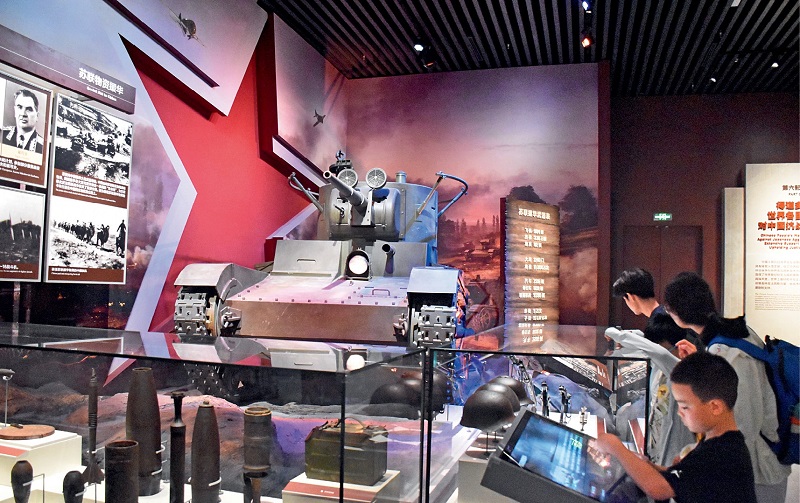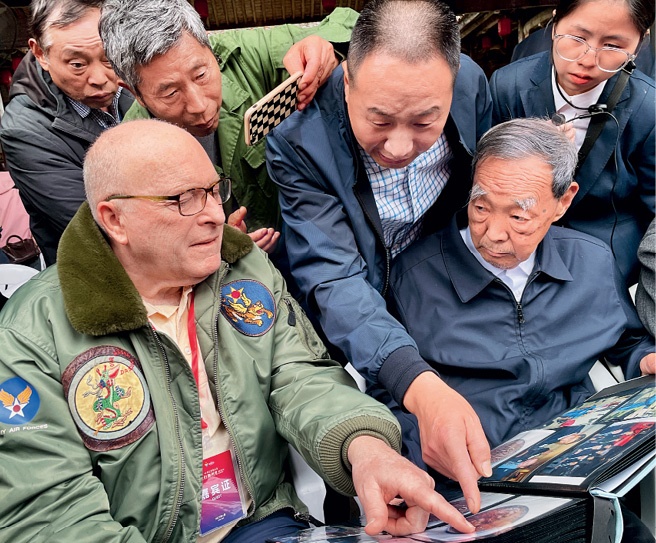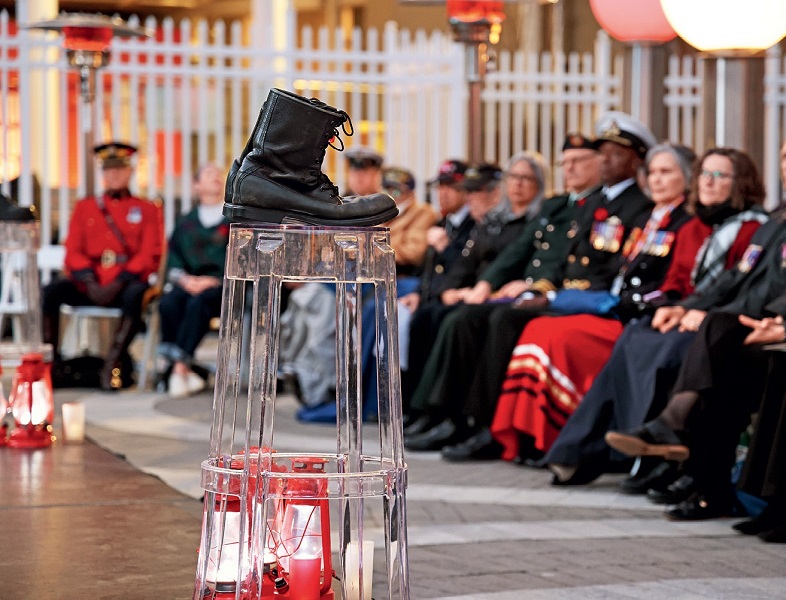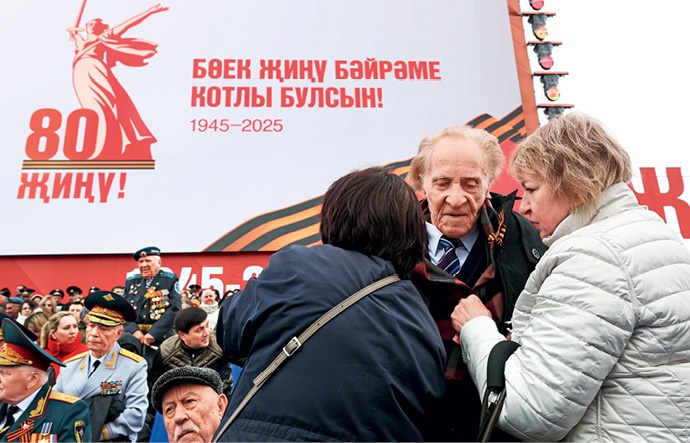
People visit an exhibition themed “For National Liberation and World Peace” at the Museum of the War of Chinese People’s Resistance Against Japanese Aggression in Beijing on July 19, 2025.
This year marks the 80th anniversary of the victory in the Chinese People’s War of Resistance Against Japanese Aggression and the World Anti-Fascist War. Pages from this period of world history not only offer historical narratives about national fates but also narrate stories of how individual people reacted under extreme circumstances. Even amid the fiercest conflicts, the spirit of humanitarianism persisted, transcending national borders and ideological divides. These acts of kindness offer a unique lens through which to understand the complexities of war and provide valuable lessons for today’s world.

At a gathering in Quzhou, Zhejiang Province, on April 17, 2025, participants commemorate the aid Chinese soldiers and civilians offered to the American pilots who were forced to abandon their planes due to running out of air fuel and parachuted into China after completing the Doolittle Raid on Japan. In the picture is Liao Mingfa, son of a local farmer who participated in helping the pilots, showing an old photo to Clifford Ray Long Jr., son of a member of the Flying Tigers.
 Humanity Knows No Borders
Humanity Knows No BordersWhile war is about fierce confrontation, in extreme circumstances, the complexity and integrity of human nature become strikingly evident, as is seen in delivering international humanitarian aid during war times. Historical archives have documented many such examples in China.
When the German businessman John Rabe who was working in Nanjing was notified that Japanese troops were approaching the city, he had the chance to evacuate but chose to stay. Together with more than 20 other foreigners, he established the 3.86-square-kilometer safety zone which helped protect around 250,000 Chinese civilians from the atrocities of Japanese invaders.
In Beijing, a French physician named Dr. Jean-Augustin Bussière risked his life creating a “Hump Route by bike” across Japanese blockade lines, through which medical supplies were secretly transported to resistance bases in the adjacent Hebei Province and the Taihang Mountains.
In southwest China, retired U.S. Major General Claire Lee Chennault organized the American Volunteer Group (later known as the Flying Tigers). His team carried out combat missions in Chinese airspace, trained Chinese airmen, and cooperated with the Chinese military to bring much damage to the Japanese air force. His work played a crucial role in defending strategic lifelines like the Burma Road.
In the East China Sea, more than 1,800 British prisoners of war suddenly became stranded on the sinking Japanese freighter called Lisbon Maru after the ship was torpedoed by an American submarine in October 1942, unaware it was transporting British prisoners of war. Thankfully, fishermen from Dongji Island, Zhoushan of Zhejiang Province, spontaneously organized a rescue effort, saving in the end 384 British soldiers from the sea.
In northeast China, the Soviet Red Army fought alongside Chinese soldiers and civilians, aiding and protecting local residents.
These people, coming from different countries and backgrounds, made similar choices under extraordinary circumstances to help their fellow human beings. Their actions transcended nationality, race, and political allegiance, and were motivated merely by simple humanitarian principles. Their stories prove that goodwill and shared values endure even in times of conflict, making cooperation and bringing people together possible.

To mark the 80th anniversary of the Victory in Europe (V-E) Day, the government of Canada hosts a commemorative ceremony at CIBC Square to welcome the Boots of Remembrance on May 8, 2025. Combat boots symbolize the service and sacrifice of Canadians who left their hometowns, boarded trains, and embarked from Halifax to fight in Europe.
Friendship across Generations
The bonds forged during war time did not fade with the smoke of battle, instead, they grew stronger with each passing generation.
Survivors of the Lisbon Maru and their descendants have never forgotten the help they received from the Zhoushan fishermen. For decades, they sought the descendants of their rescuers through various means, and eventually revisited China to express their gratitude. Together, they established memorials honoring this historic event and have remained in contact to this day.
Thomas Rabe, the grandson of John Rabe, has also maintained ties between his family and China. He donated the original manuscripts of his grandfather’s Nanjing diaries to the National Archives Administration of China. The diaries documented the atrocities committed by the Japanese military while occupying Nanjing. Thomas Rabe is also actively engaged in Sino-German exchange.
Organizations like the Sino-American Aviation Heritage Foundation in the U.S. have worked to pass on the history of wartime solidarity between Chinese and American soldiers and civilians. Through initiatives such as founding Flying Tiger Friendship Schools and organizing youth exchange camps, the foundation keeps the bond of friendship between China and America alive by sharing these stories with younger generations.
All of these endeavors have transformed history from cold archives into living memories, enhancing bonds between people across generations and nations.

WWII veteran Sovin (second from right) attends the Victory Day military parade marking the 80th anniversary of the victory over Nazi Germany in World War II in Kazan, Russia on May 9, 2025.
Inspiration for Today
Through reflecting on past wars, we come to realize that the foundation of true peace is not only the treaties signed between nations, but also the shared values and mutual assistance of individuals. This awareness of shared destiny and the spirit of mutual help shone bright during China’s anti-aggression war, from the safety zone that was established by foreigners in Nanjing for sheltering refugees and the Flying Tigers fighting side by side with Chinese forces to the Zhoushan fishermen’s rescue of British soldiers. These stories remain relevant today, as the world needs dialogue and cooperation in addressing the challenges that are facing all humanity.
The value of remembering history lies in applying lessons from the past to the present. As our human society remains in the shadow of regional conflicts and geopolitical divisions, commemorating the victory 80 years ago holds a deeper purpose: to preserve and pass on the spirit of mutual aid in times of adversity. Remembering and retelling these stories of compassion exhibited in times of conflict are acts of promoting and maintaining peace that will help build a more resilient and collaborative world. 
At a gathering in Quzhou, Zhejiang Province, on April 17, 2025, participants commemorate the aid Chinese soldiers and civilians offered to the American pilots who were forced to abandon their planes due to running out of air fuel and parachuted into China after completing the Doolittle Raid on Japan. In the picture is Liao Mingfa, son of a local farmer who participated in helping the pilots, showing an old photo to Clifford Ray Long Jr., son of a member of the Flying Tigers.